
Madhubala was an Indian actress who worked in Hindi films. The country's highest-paid star in the 1950s, Madhubala appeared in over 70 films—ranging from slapstick comedies to historical dramas—in a two decade-long career. Long after her death, she remains a Bollywood icon, particularly noted for her beauty and unconventional screen persona. In 2013, an Eastern Eye poll named her as the 24th greatest Bollywood star of all time.

Raaj Kumar was an Indian actor who worked in Hindi films. In a career that spanned over four decades, he went on to star in 70 films and is regarded as one of the most successful actors of Indian cinema.
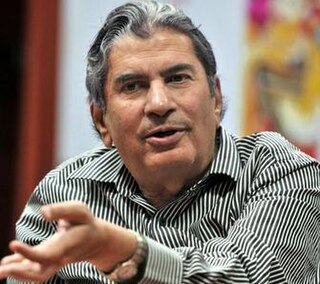
Vinod Mehta was an Indian journalist, editor and political commentator. He was also the founder editor-in-chief of Outlook from 1995 to 2012 and had been editor of publications such as The Pioneer, The Sunday Observer, The Independent and The Indian Post. He was also the author of several books.

Meena Kumari was an Indian actress and poet, who worked in Hindi films. Popularly known as The Tragedy Queen, she is regarded among the finest and greatest actresses in the history of Indian cinema. In a career spanning 33 years, from child actress to adult, Kumari starred in over 90 films.

Pakeezah is a 1972 Indian musical romantic drama written, directed, and produced by Kamal Amrohi. The film stars Meena Kumari as the eponymous lead, alongside Ashok Kumar and Raaj Kumar. It tells the story of Sahibjaan, a Lucknow-based tawaif. While asleep on a train, Sahibjaan receives a note from a stranger praising her beauty. Later, evacuating from a broken boat, she takes shelter in a tent and finds out its owner, a forest ranger named Salim, wrote the letter. Sahibjaan and Salim plan to get married, causing conflicts with Sahibjaan's professional background.

Sahib Bibi Aur Ghulam is a 1962 Indian Hindi-language drama film that was directed by Abrar Alvi and produced by Guru Dutt, who also co-stars in it alongside Meena Kumari, Rehman, and Waheeda Rehman. The film, which is based on Bimal Mitra's Bengali-language novel Saheb Bibi Golam (1953) which was the second adaptation of the novel after the 1956 Bengali film with the same title Saheb Bibi Golam starring Sumitra Devi, Uttam Kumar and Chhabi Biswas. Having seen the novel and its staged version, Dutt wanted to adapt Saheb Bibi Golam into a film, was set in the 19th century during the British Raj and focuses on Bhoothnath (Dutt), who meets Chhoti Bahu (Kumari), the lonely wife of a zamindar (Rehman). The film follows Chhoti Bahu's effort to keep her husband—who likes drinking and watching tawaifs perform—at their home by drinking with him. She becomes addicted to alcohol, leading both of them into bankruptcy.

Syed Amir Haider Kamal Naqvi, popularly known as Kamal Amrohi, was an Indian film director and screenwriter. He was also an Urdu and Hindi poet.
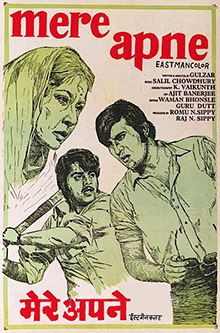
Mere Apne is a 1971 Indian Hindi-language film written and directed by Gulzar and produced by Romu, Raj and N. C. Sippy. It was Gulzar's first directorial venture and was almost a frame by frame remake of the National Award-winning Bengali film Apanjan, which was directed by Tapan Sinha. This was the first movie of Vinod Khanna as Hero. This was also debut movie of Danny. The film stars Meena Kumari, Vinod Khanna and Shatrughan Sinha in lead roles along with Deven Verma, Paintal, Asit Sen, Asrani, Danny Denzongpa, Keshto Mukherjee, A. K. Hangal, Dinesh Thakur, Mehmood and Yogeeta Bali. The music of the film is composed by Salil Choudhury.
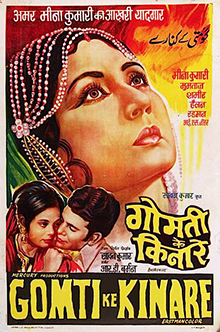
Gomti Ke Kinare is a 1972 Bollywood drama film, directed by Saawan Kumar Tak in his directorial debut. The film stars Meena Kumari and Mumtaz. It was the last release of Meena Kumari, and was released posthumously on 22 November 1972, 8 months after her death on 31 March.
The 20th Filmfare Awards were held in 1973, awarding the films made in 1972.
The 10th Filmfare Awards were held on 13 June 1963, honoring the best films in Hindi Cinema of the year 1962.

Mohan Deep, is an Indian writer. He has written multiple books on Bollywood film personalities, including the books: The Mystery and Mystique of Madhubala, Simply Scandalous: Meena Kumari, and Eurekha!: The Intimate Life Story of Rekha. In recent years, he has focused on writing fiction. Two of his novels are The Five Foolish Virgins (2013) and Color Me Rich (2016).

Bachchon Ka Khel is a 1946 Indian film produced by Ramnik Productions and directed by Raja Nene. It was released at Novelty Bombay on 2 May. The film's music is by C. Ramchandara, lyrics by Magan, Pt Sharma and art direction by Shripatrao Mane. The film starred Meena Kumari, Aga Jan, Nimbalkar, Shanta Patel and Baby Shakuntala.
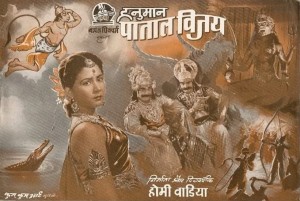
Hanuman Patal Vijay is a 1951 Hindi mythological film directed by Homi Wadia for his Basant Pictures banner. Meena Kumari starred in this devotional film with S. N. Tripathi playing Hanuman. Following her career as a child actress, Meena Kumari did heroine roles in mythologies made by Basant Pictures and directed by Homi Wadia. She had an extremely successful career for some years playing goddesses before her big commercial break in Baiju Bawra (1951). S. N. Tripathi, besides acting in the film, also composed the music. His costars were Meena Kumari, Mahipal, Niranjan Sharma, Dalpat and Amarnath.

Meena Shorey was a Pakistani film actress who worked first in Indian cinema and later Pakistani cinema. She appeared in Hindi/Urdu and Punjabi films. Credited in films by her mononym, Meena, her real name was Khurshid Jehan. She started her acting career playing a character role, as Ambhi, Raja of Taxila's sister in Sohrab Modi's Sikandar (1941). Married to her third husband, Roop K. Shorey, by the mid-1940s, she found fame when she acted in her husband's film Ek Thi Larki (1949), opposite actor Motilal. The story was written by I. S. Johar, who also starred in the film. The "foot-tapping" music composed by Vinod became a "huge hit", with Meena becoming an "icon" for the "new liberated" young women. Meena was acclaimed as the "Lara Lappa Girl", from the song of same title in the film. She was one of the first women to be recognised in Indian cinema as a "comedienne of calibre". She was also popularly known as The Droll Queen of Partition as she worked as a comedienne [Droll] in both in India and Pakistan [countries resulting from partition].
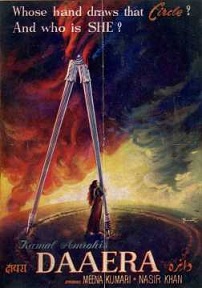
Daaera (transl. Circle) is a 1953 Indian film written and directed by Kamal Amrohi, starring Meena Kumari and Nasir Khan. It was released at Bombay's Naaz cinema. Its story is loosely based on Kamal Amrohi and Meena Kumari's own love story.
Meena Kumari (1933–1972) was an Indian actress.

Pinjre Ke Panchhi is a 1966 Indian Hindi-language film starring Meena Kumari, Balraj Sahni and Mehmood in lead roles. The film marks the directorial debut of ace music director Salil Chowdhury who also gave its music. It was a commercial failure at the box office.

Pakeezah is a 1972 film directed by Kamal Amrohi. The film is remembered as one of the most elaborate musicals of Indian Cinema.
Pakeezah is a 1972 Indian Hindustani-language musical romantic drama film written, directed, and produced by Kamal Amrohi. The film focuses on a dejected courtesan, who seeks a solution to her grief by attempting to run away from her kotha. The rest of the film follows the romance story between her and a forest ranger, and her marriage which is rejected by his family because of her professional background.
















